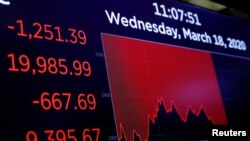U.S. stock prices were slightly down Thursday following a day of optimism raised by an experimental drug that could help beat down the coronavirus that causes COVID-19.
If successful, remdesivir, the drug developed by California-based Gilead Sciences, could help countries emerge from lockdowns and reopen businesses.
The losses at the end of the trading day also reversed April's positive trend.
The Dow Jones industrial average was down 1.17%, or 288 points, to end the day at 24,345.72. The S&P 500 was down almost 1%, losing 27 points and ending at 2,912.43. The Nasdaq Composite Index lost 0.28%, or 25.16 points, to end at 8,889.55.
European markets also ended in negative territory Thursday. London’s FTSE posted a 3.5% loss, the DAX in Frankfurt had a 2.22% loss and Paris’ CAC 40 lost 2.12%.
Asian markets fared better, with Japan’s Nikkei index gaining 422 points, or 2.14%. Australia’s S&P/ASX ended the day 2.45% higher, while Shanghai’s index gained 1.3%. The indexes in Hong Kong and Seoul were closed for public holidays.
Oil markets continued to recover, with the price of West Texas intermediate crude, the U.S. benchmark, trading at $19.09 per barrel, while the international benchmark Brent crude was trading at $26.70 per barrel.
But analysts said the future of the oil after the coronavirus pandemic was far from secure.
Shell, a British-Dutch oil company, slashed its dividend Thursday for the first time since World War II to secure some stability in a highly uncertain environment, with oil prices making wild swings.
Shell’s chief executive, Ben van Beurden, said that “the global economic decline and uncertain outlook may have a significant impact on our profitability, cash flow and our balance sheet.”
Oil demand has collapsed globally as most traffic came to a standstill amid lockdowns implemented to halt the spread of the coronavirus.





